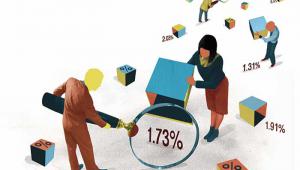I recently had the privilege of joining delegates from over 160 countries at the International Congress of Supreme Audit Institutions in Abu Dhabi last December. The event was an outstanding success and this was largely down to His Excellency Dr Harib Al Amimi and staff from the Supreme Audit Institution of United Arab Emirates.
This 22nd conference focused on two themes: How INTOSAI can contribute to the UN 2030 Agenda for Sustainable Development, including good governance and strengthening the fight against corruption; and Professionalisation: Promoting INTOSAI's credibility to become a more prominent international organisation.
As the conference unfolded it became strikingly clear that the adage “to whom much is given much is required” applies. Broadly speaking, Supreme Audit Institutions (SAIs) remit is to hold public sector organisations accountable for their use of public money. But also, they have to earn the right to hold others to account by being visibly accountable themselves.
With the support of an effective parliamentary oversight function, SAIs help to preserve trust in the public office and uphold integrity of the institution of government. Consequently, there is a growing expectation for SAIs, as guardians of public sector governance, to continuously improve themselves and the services they offer. Any inefficiencies and ineffectiveness in their administration invariably impacts on their ability to uphold strong governance. With this in mind, the supreme audit community challenged themselves and the services they deliver to inform the future strategic direction of SAIs.
There was general consensus by conference participants that SAIs should ‘practice what they preach’ by embracing continuous improvement of self and environment and never become complacent. The members of SAIs recognised that they must take every step necessary to remain relevant and become more impactful nationally, regionally and internationally.
Governments all over the world have signed up to the Sustainable Development Goals, which has resulted in both opportunities and challenges for the audit community. For example, SAIs must be adequately equipped to monitor and report on all sources and use of finances aimed at achieving tangible development results. The conference offered some suggestions on how to tackle some obvious challenges such SAIs’ independence and capacity deficits. These include:
- Seven steps mechanism to support preparing for the Sustainable Development Goals (SDGs)
- Perform and aggregate performance audit results of SDG-related assignments using the Audit Finding Framework
- Develop a common understanding of PFM systems
- Be model organisations of transparency and accountability in their conducting their work and performance
- Conduct regular assessment using tools such as SAI Performance Measurement Framework (PMF) and Institutional Capacity Building Framework (ICBF)
- SAIs to implement the INTOSAI Competency Framework
- Achieve implementation of the International Standards of Supreme Audit Institutions (SSAIs) as a mark of progress
- Spreading and sharing of knowledge
- Embrace use of digital tools and techniques
- Implement Quality Systems
Throughout the conference proceedings, there was an acknowledgement that the supreme audit community is not “an island that can stand alone”. INTOSAI is best served by leveraging its strengths and partnering with similar minded institutions in areas where its lacks the capacity and or competences to advance its agenda.
The conference provided a platform for CIPFA to feature its suite of public sector products and services to the international delegates attending the conference. In its continued dialogue and work with the audit community, CIPFA is committed to support the audit community’s capacity building efforts. This aligns perfectly with CIPFA’s advocacy and call towards sound public financial management and good governance.
Ahead of INCOSAI XXII, Public Finance International spoke to six auditors general from across the globe, including Dr Harib Al Amimi. Read their thoughts and reflections here.














